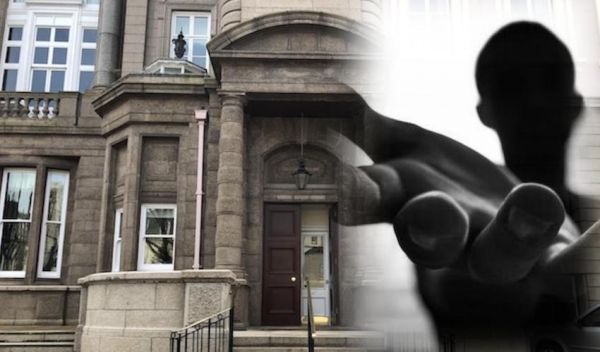

A woman with a previously undiagnosed learning difficulty has been jailed after setting fire to her home in a bid to finally get mental health support, telling police: "The lengths people have to go to to get help in this island."
Described as a "very sad case" by the defence during her sentencing yesterday, the Royal Court heard how the 60-year-old's condition had been left undiagnosed for most of her life, despite multiple wellbeing alerts being raised with the authorities.
Appearing before the Deputy Bailiff Robert MacRae and a panel of Jurats by video link, Ms A* was ultimately sentenced to two-and-a-half years’ imprisonment for one count of arson and one of malicious damage.
Crown Advocate Matthew Maletroit, prosecuting, told the Court the incident took place earlier on this year and was brought to the Police’s attention after Ms A presented herself at the station 20 minutes after setting the blaze in the hopes that prison would provide her with a sense of community and access to the mental health support that she craved.

Pictured: Ms A turned herself in at the Police station after setting the fires.
Ms A then told the Fire Service details of what she had done to her flat and let them know how they could gain access to the building.
The Crown Advocate recounted that when the defendant was arrested and cautioned, she responded: “No suspicion of arson. I did it. That’s why I’m here,” adding: “The lengths people have to go to to get help in this island.”
Once she was booked into custody, Ms A told an officer: “If I’m released today on bail, I will set fire to wherever I am released to.”
It was established that no other tenants were inside the building when the fires were lit.
The prosecutor explained that, prior to setting the fires, Ms A had also graffitied walls within the building and caused damage to the flat. The Court heard that Ms A had ongoing issues with her landlord and that she felt he ignored her maintenance requests and that he had given her one month’s notice to vacate her flat.
During her interview, Ms A explained her motivation for committing the arson, telling officers: “I’ve spent 10 years trying to get into the mental health system, and the only way sometimes to get into that is to get into the criminal justice system. And that’s a part, a lot of the reason why I’ve done what I’ve done.”
She told Police that “she knew what time each resident would leave the building to go to work and believed the building was empty” when she set the fires. She also took steps to ensure the fire stayed within her flat by closing the windows and doors so it would starve the flames of oxygen, moving items away from the walls and cutting the wires from appliances plugged into the walls.
Representing the defendant, Advocate Lucy Marks delved further into her client’s difficulties in getting support for her mental health issues.

Pictured: Ms A said she was using the criminal justice system as a means of accessing mental health support.
The defence lawyer explained that a charity and social enterprise supporting islanders with disabilities and other long-term conditions had become involved with Ms A and, out of concern for her, they instigated a psychological assessment to confirm their suspicion that she had a learning difficulty which affects her social skills.
Whilst this assessment, carried out in 2017, showed that Ms A had some characteristics of this disorder, she didn’t meet the full criteria for a formal diagnosis.
Two further referrals to the Adult Mental Health service were instigated in 2018 and 2019 respectively out of concern for Ms A’s welfare. On the first occasion, she was only offered a telephone consultation with Jersey Talking Therapies, which she refused because her condition (which has now been formally diagnosed as a result of her offending) means that she has a strong aversion to speaking on the phone.
Advocate Marks explained that, at the time of these offences, her client “had nowhere else to turn”. Thanks to a psychological report compiled for the purposes of sentencing, Ms A has now been formally diagnosed with the condition the charity suspected her of having.
Speaking about Ms A’s particular difficulties, Advocate Marks told the court that her client has “difficulty understanding unspoken social codes”. Whilst she’s “verbally very articulate”, the lawyer explained that she often takes “communication at face value” and struggles to understand that “people do not always mean what they say”, and that others have a different perspective to her own.

Pictured: The defence lawyer said that prison provides her more of a sense of community than in the outside world.
The defence lawyer emphasised that this was a “significant diagnosis” for her client to receive “so late in her life” – speculating on “how things might have been different for her had the diagnosis been made earlier on.”
However, Advocate Marks stressed that “it is not the diagnosis of [this condition] that explains her criminality”, but rather “the absence of a diagnosis and, critically, the absence of support."
Concluding, Advocate Marks asked the Court to impose a suspended sentence to allow Ms A to be released to supported accommodation at a care home dedicated to caring for those with special needs.
Handing down the Court’s decision, the Deputy Bailiff - sitting with Jurats Austin-Vautier, Olsen and Thomas - indicated that due to the risk of Ms A reoffending if her needs aren’t fully met in the community, the Court felt unable to impose the suspended sentence.
Acknowledging that “this really was a cry for help”, the Deputy Bailiff expressed hopes that Ms A will continue to make progress with the prison’s Forensic Psychologist before she is eligible for conditional early release next year.
Imposing a two-and-a-half year prison sentence, the Court also expressed the hope that the supported accommodation is still available to Ms A upon her release and that “arrangements are made now” to provide her psychological support in the community as soon as she’s out of prison.
* Express has anonymised the defendant, due to the sensitivity of this case and the mental health issues involved.
Comments
Comments on this story express the views of the commentator only, not Bailiwick Publishing. We are unable to guarantee the accuracy of any of those comments.